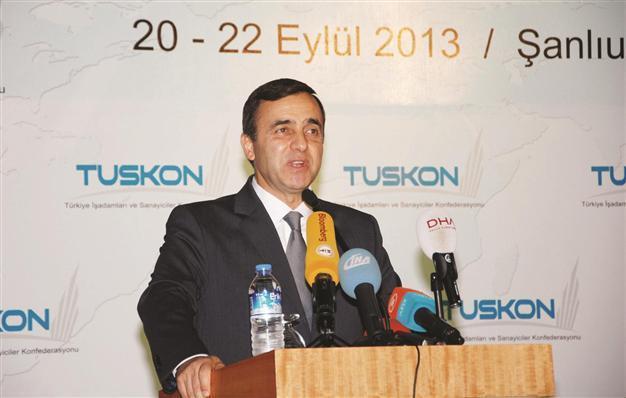Future business in Syria not predictable, says head of a Turkish business group
Deniz Çiyan ŞANLIURFA – Hürriyet

Rızanur Meral, the chairman TUSKON, said that all their members who had invested in Syria had to suspend their business there due to the unstable situation in the country.
The situation in Syria is piteous and no investment can be planned for Syria at the moment, whereas Turkish investors in Egypt have encountered hardly any problems during the revolution and coup, the head of a Turkish organization representing businesspeople and industrialists has said.Rızanur Meral, the chairman of the Turkish Confederation of Businessmen and Industrialists (TUSKON), told the Hürriyet Daily News that all their members who had invested in Syria had to suspend their business there due to the unstable situation in the country and since the future of the investments could not be predicted.
“Right now, nothing new can be even thought of being done in Syria. There were people [TUSKON members] who had investments in Syria. They have encountered pecuniary loss and their factories are also idle. Some of the factories were damaged too. It is not known whether there will be a return ever again,” said Meral.
Meral said that the situation in Egypt was different than in Syria, as most of their TUSKON investors had not faced major problems and had hardly interrupted their production in Egypt, both during the Arab Spring in 2011 and the military coup this past July.
“We have plenty of members who have invested in Egypt and their businesses were not disrupted either during the first revolution or the coup. They kept producing, their factories were not damaged and the state of Egypt did not cut back – even to the slightest degree – on the government promotions,” said Meral. “They are keeping the foreign capital comfortable.”
Meral added that though the already established factories were doing well in Egypt, they had not heard of new investments headed for that country.
Seeking new markets
Asked whether TUSKON had a foreign enlargement strategy, Meral said that apart from the five TUSKON offices in Brussels, Washington, D.C., Moscow, Beijing and Addis Ababa, they were not considering expanding their foreign offices and thus valued gaining partner foundations, of which they had around 100.
Meral said markets around the world had great potential as new importers were emerging every day and Turkey’s producers should not consider that their products could not compete in foreign markets.
“We believe that by going to new destinations we can increase our exports with the current structure of our production. It is a fact that Turkey cannot increase its products’ added value in a day. This is a process. We have to find markets where we can sell the products that we produce today. Thus, the world is our playground,” said Meral, adding that not only trade but also production in new destinations should be pursued. Meral said that the Turkish products were at an ideal point in the quality-price ratio in the world and the most important step in increasing the exports was to find the right importer company in various countries.
















